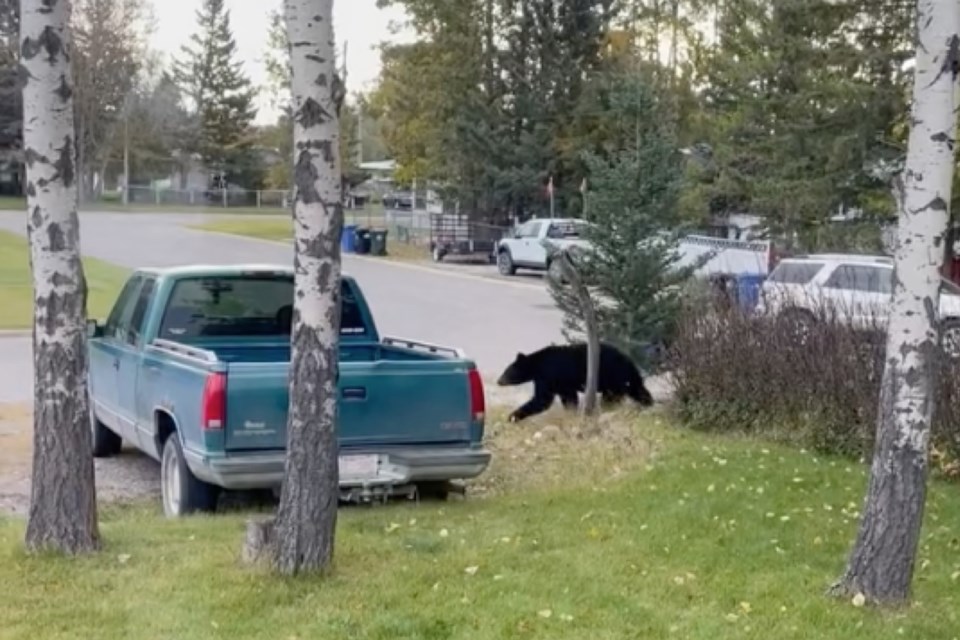SUNDRE – A black bear that made its way through town over the weekend was successfully tranquilized by a local Fish and Wildlife officer and subsequently captured before being relocated.
Pictures of the male animal, which Fish and Wildlife district officer Levi Neufeld said was determined to be about three to four years old weighing between 68 to 113 kilograms (150 to 250 pounds), were posted on social media Sunday, Sept. 24 crossing Highway 27 near Tim Hortons.
At about 9:30 a.m., an officer responded to a report of a black bear up a tree on 4th Street northwest that had been called in through the Report a Poacher line, Neufeld told the Albertan yesterday morning.
“He went and assessed the situation, and we couldn’t properly haze the bear outside of town,” said Neufeld.
Hazing essentially means startling an animal so it leaves the area on its own accord without taking further measures. However, that approach would require already being on the surrounding outskirts of town, he said.
“But this bear was too much in the centre of town; too many buildings, too many obstacles,” he said.
That prompted the responding officer to make the decision to tranquilize the bear, said Neufeld.
“We captured the bear and put it into a bear trap,” he said.
Fortunately, although the bear was searching to stock up on calories ahead of the coming winter, the animal did not get into any food sources such as compost piles or garbage bins, he said.
“It wasn’t habituated in the sense that it’s been frequenting town. So, we are releasing it today (Monday, Sept. 25) as far west as we can take it,” he said.
“It’s not very often we get this opportunity. He was a good bear, just stumbled into town at the wrong time of day,” he said.
Responding to a question about how long it typically takes a bear that’s been tranquilized to fall soundly asleep thereby enabling officers to relocate the animal, he said there are a lot of moving parts at play.
“It’s tough to say. It depends on so many variables: how stressed out the bear is, what the shot placement is – if we get it (the dart) into fatty tissue, obviously there’s not enough blood flow in there to really absorb the drugs in a timely fashion,” he said.
“In this case, it took no more than five minutes and the bear was tranquilized and asleep.”
However, that’s not always the outcome, he said.
“We’ve had situations where it took over 40 minutes for the drugs take effect though,” he said. “Each situation’s completely different. There’s no textbook way of how these things go. They’re very dynamic.”
WATCH: Black bear relocated west of Sundre:
The public is reminded that at this time of year, bears are more active as they search for food to fatten up for their impending hibernation cycle.
“They have a great sense of smell,” he said, adding that scent-producing sources such garbage or ornamental fruit trees and bushes all are potentially appealing attractants that can get bears coming around until they’ve built up enough calories to get through winter.
In this instance, the outcome was about as good as officials – and arguably the bear – could hope for.
“This is definitely a positive event where we didn’t have to euthanize the bear and we can relocate it,” he said.
Sightings can be called into Report a Poacher at 1-800-642-3800.



